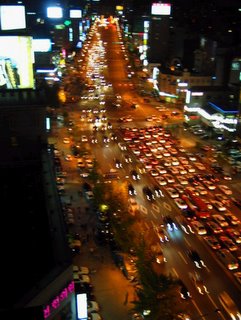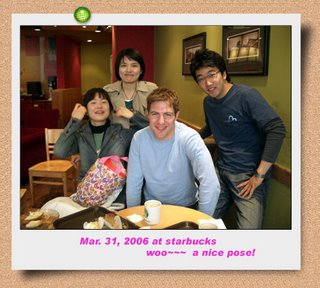Here is a great article by Tracey Stark on the reality of what South Korea is really like. These days, it seems as though lots of people are worried because of North Korea. Those doing the worrying are mainly people outside of South Korea! Enjoy what Tracey has to say and please visit the site. There are plenty of good posts and pictures about what life in Korea is really like.
I hope Tracey doesn't mind me posting this here!
Jason
Tracey Stark on...: Danger in Korea: Western Myth No. 1Danger in Korea: Western Myth No. 1
From The Korea Herald
Tuesday, November 15, 2005
Very few Koreans can conceive the possibility of the North attacking
The following is the second in a five-part series of articles on how Korea is conceived by foreigners and what efforts Koreans should make to enhance its images abroad. - Ed.
By Tracey Stark
It is a commonly held belief in the West that the Korean Peninsula is a powder keg waiting to be ignited by some random event, resulting in a second Korean War.
A foreigner might also believe that in Seoul - a scant 50 kilometers from the North Korean border - there is palpable fear and worry that their northern neighbor, nay, their brothers, are inclined to attack. But ask any Korean or foreign resident walking down the street and they will tell you the same thing: Anxiety over the communist state to the north is minimal and seldom a subject of everyday conversation.
"When I traveled abroad it was something people asked me about often," said Lim Seung-eun, 27. "I was even urged not to return to Korea by my friends in Australia."
A teacher in Gyeonggi Province from the United Kingdom, Graeme Armitage, 27, recalled before coming to Korea more than three years ago that although he and his parents didn't have any preconceived notions about Korea, he had friends and family who continually confused North and South Korea, and thought he was going to live in the communist North.
"There was no concern from my parents that I was in any danger, but other relatives weren't so clued up on Korea. They knew very little about the place."
Western media may be partly to blame. News with the mention of Korea is most often sensationalized stories about the looming threat of North Korea, or a story involving large animals running wild through Seoul. (Recently a story about a woman in Seoul whose baby stroller got caught in the doors of a subway is being shown frequently on CNN.)
That is changing these days with international events being held in Korea like the World Cup, Pusan International Film Festival and the current Asia-Pacific Economic Cooperation summit being held in Busan. While the coverage may only last a few days, and then return to the ongoing saga of the six-party talks, it is effective in separating myth from reality.
"Before I came to Korea I didn't know what to expect. It seems like all the news you hear about the country has to do with North Korea's aggressive stance," said Dan Secor, a 34-year-old American, who lives in Ilsan with his Korean wife. "But you get here and see that this country has been neglected by the media."
Secor added that on a trip home to Massachusetts when he told people he was in Korea the second most frequent question - after the North Korean issue - was "Did you see the elephants run rampant through Seoul?" referring to an isolated event in a very small part of a very large town.
A group of dedicated Koreans have taken up the task of spreading the truth about South Korea. The Voluntary Agency Network of Korea began in 1999 and now has 15,000 members and set its task as the disseminating of the truth about Korea.
"All VANK's members are guiding overseas Koreans and foreigners so that they can better understand Korean culture, language, or situation, etc. through e-mail or postal-mail and at the same time we are building friendships, bridging cultures and changing the image of Korea as cyber diplomats," VANK's website, www.prkorea.com, says.
But the question must be posed: Why would people worry?
For starters, in the event of a war, the initial bombardment on Seoul would be in the neighborhood of 500,000 rounds per hour landing on Seoul, according to the U.S. military. This bombardment wouldn't be contained for several days. The outcome would be disastrous.
Secondly, North Korea dropped out of the Nuclear Nonproliferation Treaty and then subsequently bragged about possessing nuclear fissile material - enough for several warheads. They have also advanced in short- and long-range missile technology.
With the breaching of multiple international agreements on the part of North Korea, it is accepted by many in the South that the North's government can't be trusted. But with recent progress in the six-party talks and the nuclear threat diminished, the world may be breathing a collective sigh of relief.
Very few ordinary Koreans can conceive the possibility of the North attacking them.
"They look like us and we speak the same language. The only way they would attack is if they were attacked first," said student Cho Hyun-i. She added that it was unlikely that South Korea would make such a move and pointed to the United States as the most likely catalyst of a war ever starting on the peninsula.
With a population of 48 million in an area about the same size as the U.S. state of Virginia (population 7.4 million), crime can be another worry.
The numbers show this to be false as well, as 2002 crime rates for Korea were significantly lower than those of neighboring Japan, in most areas, and the United States, United Kingdom and Germany in all categories.
The overall crime rate was 1,674 incidents per 100,000 people in Korea, while those numbers were more than one third higher in Japan at 2,240 per 100,000. The United States and the United Kingdom followed with 4,119 and 11,240 per 100,000 people respectively. Murder rates in 2002 for Korea, the United States and United Kingdom per 100,000 were 2.1, 5.6 and 3.5 respectively. Rape and sexual assault in those same three nations were 19.8, 33 and 86.6 per 100,000 respectively.
"I feel safer walking down the street late at night in Seoul than I did in Boston," said Secor. He added that the drug culture of the big cities of America were what led to higher crime rates. "Korea seems pretty drug-free."
An outsider may be surprised to see many busloads of Korean police around the city, but this in no way reflects a high crime rate. They are most often used as crowd control around important buildings or to prevent the frequent protests from getting out of hand around the capital.
"It's a reflection of our growth as a democracy to see so many protests. Under President Park (Chung-hee) these things would not have been permitted," said university student Cho.
Although it may not be an urban utopia, Seoul has lifted its status in the world from the center of government of a less-developed, semi-democratic nation, to a rapidly growing, culturally diverse, center for international business and travel. Infrastructure improvements and an economy that made a quick recovery from the 1997-98 Asian financial crisis has proven to the international business community that Korea is no longer a poor Hermit Kingdom.
"Life is too short to worry about such things. We have learned a lot from our mistakes of the past. We will someday be united and that will make everyone in the world safer," Lim said.
(traceystark@heraldm.com)








